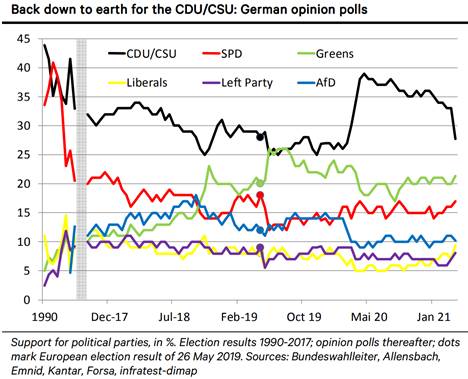Click here for full report and disclosures
â  Mismanagement hurts: Last March, a deft response to the pandemic sent support for Chancellor Angela Merkel and her CDU/CSU almost into the stratosphere. Whereas Germany handled the first wave of the pandemic better than most other developed countries, this is no longer the case. Confusing policy shifts and slow vaccination progress have now undermined public confidence in the ability of the CDU/CSU, which has led the government for most of post-war history including the past 15 years, to steer Germany through the crisis. Against this backdrop, a kickback scandal involving CDU/CSU members of parliament has resonated with the public. Polls show a fall in support for the CDU/CSU back to pre-pandemic levels â see chart. Merkelâs U-turn away from an âEaster shutdownâ may add to the woes.
â  Nature abhors a vacuum at the top: The plunge in public support adds to pressure on the CDU/CSU to nominate its candidate to succeed Merkel as chancellor quickly. A decision shortly after Easter would make sense. The problem is obvious: as the leader of the bigger CDU, Armin Laschet remains in the pole position for the job. But his rival Markus Söder from the smaller CSU still seems to have more electoral support â although the past three weeks may have hit the CSU as much as the CDU. If the ambitious Laschet does not yield to Söder â or is not asked behind closed doors by other party bigwigs to do so â Laschet will probably prevail. In the current circumstances, an open conflict in which Söder and his allies try to push a reluctant Laschet aside would probably hurt the CDU/CSU even more than usual.
â  Do not count out the CDU/CSU just yet: It is still early days. A lot can happen in the six months before Germany goes to the polls on 26 September. If the CDU/CSU-led government manages to speed up the vaccinations in line with the current outlook for vaccine deliveries so that most Germans can enjoy a summer holiday, the mood may still brighten. The CDU/CSU remains the favourite to win the election. But after the recent string of mishaps, we reduce our probability that the chancellor to succeed Merkel will be from her CDU/CSU from 75% to 70%. A CDU/CSU-led coalition would likely include the Greens as the not-so-junior partner (60% probability) or â less likely - the current partner SPD (10%).
â  It takes some 47% to oust the CDU/CSU: Parties with less than 5% of the popular vote do not make it into the Bundestag. As the minnows may receive around 6% together, a coalition needs 47% of the vote for a majority of seats. Judging by the average of the past five opinion polls, a âtraffic lightâ alliance between the Greens, the centre-left SPD and the liberal âyellowâ FDP could make it with 47.6% support, whereas a âGreen-red-redâ coalition of Greens, SPD and Left Party would fall narrowly short with 46.4%. We attach a 15% probability to the traffic-light coalition and 15% (up from 10%) to Green-red-red. Only the latter option would lead to a major policy shift, notably in terms of tighter labour, housing and product markets regulations that would reduce German trend growth significantly over time.
â  All bright and Green? One way or the other, the Greens look set to be part of the next German government (probability of 90%), either as partner of the CDU/CSU (60%) or in a âtraffic lightâ or Green-red-red alliance (30%). In a coalition without the CDU/CSU, they would likely nominate the chancellor, either the more charismatic Robert Habeck or the more policy-savvy Annalena Baerbock. Click here for our analysis of what the Greens may be up to.
Chief Economist
+44 7771 920377
holger.schmieding@berenberg.com
Disclosures
This material is intended as commentary on political, economic or market conditions for institutional investors or market professionals only and does not constitute a financial analysis or a research report as defined by applicable regulation. See the "Disclaimers" section of this report.
The commentary included herein was produced by Joh. Berenberg, Gossler & Co. KG (Berenberg). For sales inquiries, please contact:
Phone: +44 (0)20 3207 7800
Email: berenberg.economics@berenberg.com
BERENBERG
Joh. Berenberg, Gossler & Co. KG
Neuer Jungfernstieg 20
20354 Hamburg
Germany
Registered Office: Hamburg, Germany
Local Court Hamburg HRA 42659
Joh. Berenberg, Gossler & Co. KG is a Kommanditgesellschaft (a German form of limited partnership) established under the laws of the Federal Republic of Germany registered with the Commercial Register at the Local Court of the City of Hamburg under registration number HRA 42659 with its registered office at Neuer Jungfernstieg 20, 20354 Hamburg, Germany. A list of partners is available for inspection at our London Branch at 60 Threadneedle Street, London, EC2R 8HP, United Kingdom.
Joh. Berenberg, Gossler & Co. KG is authorised by the German Federal Financial Supervisory Authority (BaFin) and deemed authorised and regulated by the Financial Conduct Authority. The nature and extent of consumer protections may differ from those for firms based in the UK. Details of the Temporary Permissions Regime, which allows EEA-based firms to operate in the UK for a limited period while seeking full authorisation, are available on the Financial Conduct Authorityâs website. For further information as well as specific information on Joh. Berenberg, Gossler & Co. KG, its head office and its foreign branches in the European Union please refer to http://www.berenberg.de/en/corporate-disclosures.html.
